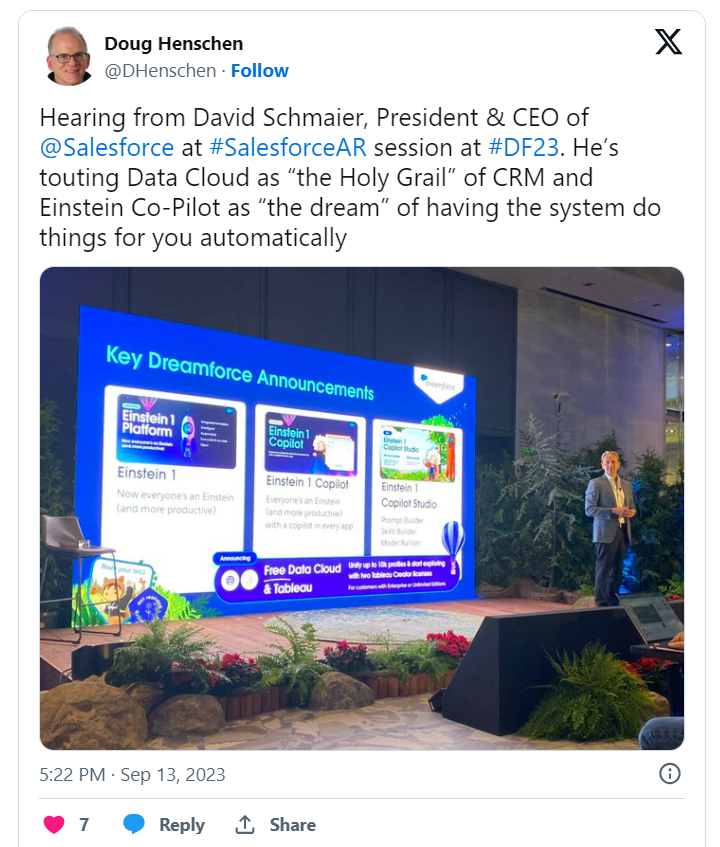The Surprising Link Between Tech Industry Trends and Your PR Strategy

This article was originally published on Cision.com. We are reposting with their permission.
The technology sector never stands still, which doesn’t make the job easy for PR professionals who work in the field. As we know from the Global Comms Report, PR and comms teams are feeling more pressure from the C-suite today to respond to changing marketplace dynamics and opportunities in a timely manner.
That is a tall order in and of itself, especially when only 25% of comms leaders rate their teams as “excellent” in their ability to do so. For the tech industry, the struggle to keep up is even more pronounced. In an industry that already moves faster than most, the last 12 months were quite remarkable, with artificial intelligence (AI), disruption in the social media space, and high-profile product launches dominating news cycles.
Just as companies like Apple, Amazon, and Meta race to produce the most cutting-edge products and services, PR teams hurry to bring attention and awareness to those companies, product and services. So who’s winning? And more importantly, what can we learn from those winners?
Using a recent Cision analysis of the biggest tech industry news and social conversations from last year, we looked at the meaning behind those trends and the lessons they hold for PR and comms professionals across all sectors.
SXSW Is the Most-Discussed Tech Event
SXSW has grown into a hub for film, music, technology, and innovation, so it’s no surprise to see it leading the list of the most-discussed tech events in 2023. The appearance of NASA and the CIA at the Austin festival helped drive conversation, with the latter’s Deputy Director, David Cohen, bringing a ‘Spies Supercharged’ presentation about the use of technology to safeguard U.S. citizens and businesses.
In second place in the tech events rankings was Salesforce’s Dreamforce 2023 conference, which saw a remarkable 583% rise in discussion volume compared to 2022. That’s a near-600% year-on-year increase, thanks largely to social media activity. Posts with #DF23 focused majorly on AI, including mention of its Einstein 1 Platform.

Camille Rollason, Cision’s Sector Lead (Technology), said of Dreamforce’s strong showing: “Salesforce was extremely active in pushing out posts from its owned channels, @ing individual users to highlight the event’s AI focus. Salesforce's CEO telling the audience, “I'm a remote worker,” certainly also helped to garner interest online.”
Sitting in third spot for 2023 tech event discussion was Apple’s Worldwide Developers Conference (or WWDC23). The event saw Apple unveil the Vision Pro mixed reality headset, its first new major product category since the Apple Watch in 2015. Vision Pro accounted for 39% of all WWDC23 discussion, and helped drive a 17% year-on-year increase in coverage volume.
The full list of 2023 technology event media coverage in 2023 (with volume of articles/posts and year-on-year percentage change) is below:
Apple Leads Tech Company Conversation
According to Cision data, and as the popularity of WWDC23 suggests, Apple was the most mentioned tech company in the media in 2023. Though Apple’s revenue dipped last year, a steady stream of product announcements and launches, including the iPhone 15 and Vision Pro, helped it secure pole position.
Remarkably, 93% of all product discussion across social media was Apple-related. The launch of the iPhone 15 also drove the highest peaks in coverage for all three of 2023’s top social influencers: Marques Brownlee (MKBHD), Arun Maini (Mrwhosetheboss), and Gaurav Chaudhary (technicalguruji).
The top tech companies for media coverage in 2023 are below:
Of the top 10 companies, Netflix experienced the biggest year-on-year fall in coverage with a 33% drop. Last year the streaming giant rolled out a new policy around password sharing, a price hike on its basic plan, and an ad-supported tier.
According to Rollason, the Netflix decline is down to the streaming service’s content output. “Netflix’s owned channels were extremely active in promoting its content on 2022 – they appear to have dialled this down in 2023 – but 2022’s high volume compared to 2023 was in large part due to the buzz around Prince Harry and Meghan Markle’s controversial documentary release in December,” she explained. “No show or film in 2023 achieved quite the same level of interest – and that seems to be mostly what people care about when talking about Netflix, even when considering the platform’s password sharing update.”
Despite the prominence of AI in 2023 (it was the most-discussed tech topic of the year), OpenAI is down the list in 13th place in terms of media coverage. However, the Sam Altman-led startup saw a 1,417% growth in mentions compared to 2023.
Conversations Around OpenAI and Web3 Spike
As noted above, OpenAI saw a notable increase in mentions across 2023. Combined discussion around the company, and its flagship platform, ChatGPT, led to an astounding 2,565% increase from 2022. CEO Sam Altman’s removal and re-instatement in November drew prominent voices on X, but prior to this there was plenty of buzz around Bing integration and the launch of GPT-4.
Discussion around Web3 rose by 77% year-on-year, driven largely by Binance and Portal’s frequent social media posting on crypto. However, conversation on this topic has also been steadily growing thanks to gaming and AI’s blockchain integration.
Meanwhile, in the wider industry, discussion around layoffs rose 57% year-on-year. This began with Amazon’s announcement of over 18,000 staff cuts back in January of 2023. The likes of Salesforce, Microsoft, Google, IBM, SAP, PayPal, Zoom, Yahoo!, and Meta all followed suit in 2023 with news of job losses.
Looking at the broader topic discussions in 2023, AI was unsurprisingly leading the rankings for volume of coverage across online and social. The drama around OpenAI, Tesla and X CEO Elon Musk’s frequent posts on the topic, and talk around regulation kept the technology prominent throughout the year.
Gaming coverage may have decreased slightly year-on-year (down 18%) but it still placed second-highest for topics in 2023. Gaming laptops like Lenovo’s Legion Pro 7i drew coverage early in 2023, while the launch of the first Grand Theft Auto 6 trailer ended the year strongly.
The top tech topics based on volume of online and social media posts are below:
Rises and Falls in Tech Personality Power Rankings
Cision data shows that CEOs dominated discussion for tech personalities in 2023, with Elon Musk far ahead in first place. His mentions fell slightly from 2022, but a combination of platform and staff changes at X, and regulatory challenges for Tesla kept him in the spotlight.
Ex-CEO of FTX, Sam Bankman-Fried, was in second place but largely due to the crypto exchange’s collapse and his conviction on fraud and conspiracy charges.
OpenAI’s Altman saw a sizable 11.6k% increase in volume of coverage on the back of his startup’s emergence as a tech player through ChatGPT. His close association with AI developments kept him in sharp focus throughout the year. “Altman’s swift firing and hiring was a tech story that could grasp the interest of everyone and anyone,” Rollason says. “It was popular across social and traditional media alike, and the way it was being talked about seemed to encapsulate both the celebrity status around AI pioneers as well as everyday fears about who truly sits in the driving seat of AI companies and their relatively untested tech.”
Mark Zuckerberg landed in fourth place, in a year that saw the EU fine Meta $1.3b for privacy violations, the company launch X competitor Threads, and unveil the Quest 3 virtual reality headset.
The top tech personalities of 2023, based on volume of articles and social posts:
Beyond the Tech Trends: 4 Takeaways for PR Teams
No matter your industry, it’s critical to be aware of latest developments and the coverage being generated by the media. What’s popular today won’t necessarily be the same tomorrow. That brings up some key questions PR teams should ask themselves when creating their own event campaigns.
- What’s resonating in your industry? Knowing the trending topics in your own industry, what’s rising and falling, can help inform how you communicate with your audience through the media. It can also help you pivot messaging quickly if needed, and ensure you tackle topics with nuance when required. It’s crucial to not only see what’s dominating conversation, but why. Media monitoring tools like CisionOne can provide critical metrics around your brand, its competition, and relevant topics. CisionOne’s Risk Score feature in particular is designed to monitor sensitive coverage around your brand, enabling you to proactively mitigate or react to content that could lead to controversies.
- How are your competitors showing up? What are brands in your sector bringing to events, announcements and launches? And where does your product and story fit in? Not every brand will be able to create the “wow” moment of a lightsaber unveiling (as Disney demonstrated at SXSW) but is there any way you can generate excitement with your own unique angle? Also, it’s well worth evaluating what your competitors do well – and any perceived mistakes they make – for quick lessons to take into your own approach.
- Where is the media’s attention? Be proactive when it comes to events in your sector and plan out your calendar before looking for journalists who’ll be attending (then time your media outreach). Events like SXSW and Dreamforce generate sizable industry attention, so depending on your niche, it’s also wise to look for smaller events where audiences may be more engaged and coverage more attainable. Media monitoring platforms can also help here, helping to track conversations across print, broadcast, online, and social and identify how different events are being covered or talked about.
- Who are your industry influencers? Understanding who your biggest industry influencers and thought leaders are is crucial. Keeping an eye on those ‘on the rise’ (such as OpenAI’s Altman), and why they’re trending up, can help steer how you position and shape messaging around your own C-level execs. Partnering with someone external may also help further your brand story, and while tech’s dominant channel for influencers is YouTube (MKBHD has 18 million followers on the video platform), that might not be the case for your own sector. Evaluate engagement across LinkedIn, Instagram and other social media to see where your audience is.
The Bottom Line
All of these insights show that closely monitoring developments in your industry (particularly if it’s fast-moving and ever evolving) and how the media covers it, will allow your team to provide more strategic value to your clients, demonstrate expertise in your sector, and strengthen your ability to tell compelling brand stories that the world is talking about.
You'll be better placed to help executives understand these trends and position them as leaders in this space, craft more relevant PR materials that aligns with media coverage and consumer interest, and identify the journalists and influencers talking about these trends.
To find out how PR Newswire can help your brand get noticed, speak to one of our experts.
About the Author
 Simon is the Content Marketing Manager at Cision UK. He worked as a journalist for more than a decade, writing on staff and freelance for Hearst, Dennis, Future and Autovia titles before joining Cision in 2022.
Simon is the Content Marketing Manager at Cision UK. He worked as a journalist for more than a decade, writing on staff and freelance for Hearst, Dennis, Future and Autovia titles before joining Cision in 2022.